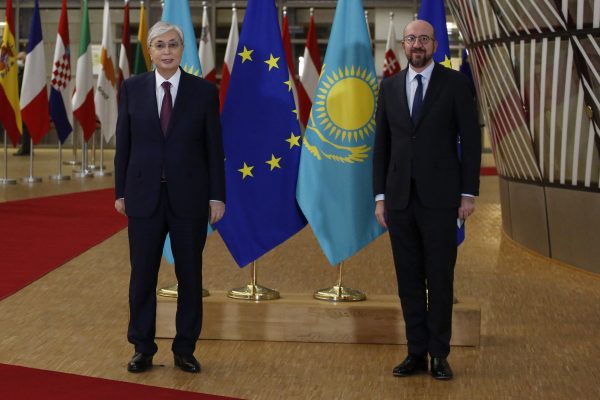After the grandiose Shanghai Cooperation Organization meeting in Samarkand in September 2022, several summits were held to further EU–Central Asian connectivity. The President of the European Council, Charles Michel, visited Uzbekistan and Kazakhstan in October. Chinese President Xi Jinping also visited these countries — his first foreign visit since the beginning of the COVID-19 pandemic.
EU delegates, who have been making more frequent visits to Central Asia, often criticise China’s active engagement in the region. German Foreign Minister Annalena Baerbock stated during her last visit to Uzbekistan that ‘Germany does not threaten the sovereignty and integrity of the state by giving ‘tricky’ loans, but wants to establish partnerships on equal terms, honesty and transparency. When it comes to investment and loans, the EU does not assume subordination, and involvement in the sphere of influence unlike others’.
The EU claims that it is the biggest investor in Central Asia. But it is the largest investor in Kazakhstan only, which is the biggest economy in the region, and most European investment there has been directed towards the energy sector. Kazakhstan is considered less dependent on China compared to other countries in Central Asia. Although China was not among the top five investors in Kazakhstan in 2021–22, it is still the country’s biggest trading partner.
The other four countries in Central Asia have received most of their FDI from China. China’s investment in the region has been more diverse than Europe’s. According to statistical reports in 2021, China’s investment in Uzbekistan reached US$2.2 billion. This was followed by Russia — US$2.1 billion — and Turkey — US$1.18 billion. China’s investment in Tajikistan accounted for about 62 per cent of total inward FDI. As for Kyrgyzstan, 27 per cent of FDI was from China. There are no exact statistics for Turkmenistan, but according to some sources, China remained the biggest investor in 2021. As Chinese businesses steadily enter many sectors such as telecommunications, industry, manufacturing, construction and services, the influence of Chinese companies is becoming ubiquitous.
For China, Central Asia is an important geopolitical location and transport corridor. The China–Kyrgyzstan–Uzbekistan railway project is also expected to boost connectivity. China is not a member of the Paris Club — meaning it does not share information about its official loans to other countries — and is also known for ‘debt trap’ diplomacy. Because of this, loans and investments from China worry the intellectual elites of Central Asia.
Due to fears of economic dependence and China’s actions towards the Uyghur minority in Xinjiang, anti-Chinese sentiment has been growing, and several protests have occurred in Kyrgyzstan and Kazakhstan. Such protests are usually ignored and sometimes stopped with force because of strong diplomatic ties with China.
Central Asia does not want to disappoint either side and maintains equal diplomatic ties with the East and West. Uzbekistan reached a US$15 billion agreement with China in September 2022, and also cooperated closely with the EU to increase its export capabilities.
The same goes for Kazakhstan, whose relationship with China is at an ‘unprecedented level’. During Xi’s visit, both countries affirmed to respect and support each other’s sovereignty and territorial integrity. But Kazakhstan also agreed to step up its relations with the EU during a meeting of the Cooperation Council in Luxembourg on 20 June 2022.
The EU’s attempt to connect more with Central Asia is an opportunity for Central Asian states to cooperate with a ‘neutral and experienced’ partner to improve their economic situation and diversify political relations. The EU also provides a good example to Central Asia of a successful model of regional integration. Diversifying their relations and keeping a balance of power is important for both Central Asia and the EU — depending on just one partner in any sector comes at a heavy cost, as the energy crisis in both regions has revealed.
But Central Asian countries have not been eagerly participating in all proposals by the EU. The leaders of Central Asian states are usually cautious when it comes to joining such initiatives. These authoritarian leaders are not interested in following the EU’s democratic institutions. There is fear among some conservatives in Central Asia that with European values comes liberal ideology, which is perceived as incompatible with core cultural and religious beliefs.
The EU’s strategy in Central Asia is not flexible enough to adapt to the local political and cultural environment, which will lead to their efforts not being taken seriously by both political leaders and the general public. Most initiatives and proposals are forgotten after some time.
To elevate EU–Central Asia connectivity, more must be done than just trading hydrocarbons. Europe will need to create better transport infrastructure, as well as facilitate financial, educational and cultural exchanges. Projects should be monitored closely by public institutions in both regions. Governments and local political bodies should be engaged in more extensive political dialogues that frame this engagement.
The EU should reconsider its Central Asian connectivity plans. Otherwise, the EU is going to remain geographically, culturally and politically distant from the region, just like in the past.
Donaev Mukhammadsodik is Junior Researcher at the OSCE Academy in Bishkek and PhD candidate at Zhejiang University. His research interests include Central Asian media space, Media imperialism and China’s engagement in Central Asia.

